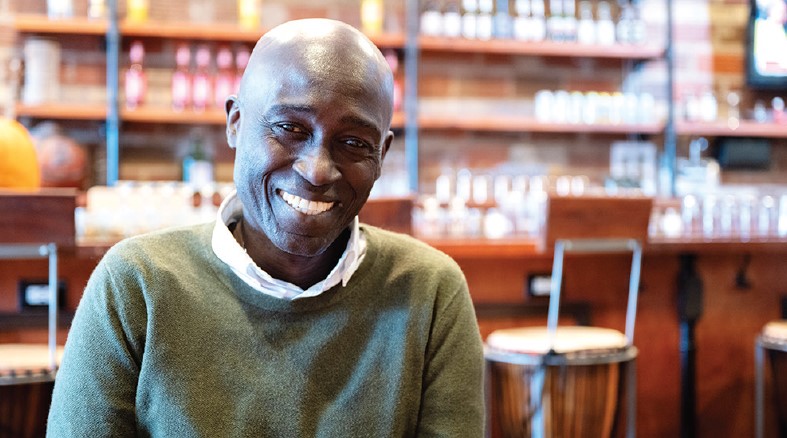
Feeling at Home at Mansa Kunda
For Hatib Joof, a restaurant is a home. His restaurant, Mansa Kunda, on Flower and Erie Aves., both evokes his childhood home in Gambia and creates a new homespace here in Takoma Park.
“I hope that the people who bring their kids here, 30 or 40 years from now they will say, ‘I used to go there when I was a
kid.’ This will be a place that they come to,” says Joof.
In 2019, Joof opened Mansa Kunda—a king’s domain in Mandingo—with the notion that Takoma Park would be the ideal home for his West African cuisine. Over the previous 23 years, Joof had been the manager of the Spring Mill Bread Company, which used to supply the Takoma Park Silver Spring Food Co-op with bread and pastries before opening a storefront in Takoma Junction. So Joof had a good understanding of the location.
“In the DMV area, Takoma Park was the only place that I know that has the diversity and the people who are curious enough to entertain the idea of having a cuisine that is unorthodox,” says Joof. “Gambian or Senegalese cuisine is not mainstream.
“People ask me, where is The Gambia? And I have to say, ‘Well, do you know West Africa?’ Yeah. Everybody knows Nigeria, Ghana. And then I say, ‘Do you know Senegal?’ Oh yes. ‘Well, Gambia is inside of Senegal.’
Although Joof is, himself, a vegetarian, he recommends the seafood peanut butter chu, a dish that celebrates the coastal culture of The Gambia.
“Chu is like a gumbo,” says Joof. “So it does have shrimp, it does have crabs, it does have smoked catfish, it does have white fi sh. And it is very thick because it does have yuca in the broth in it. That’s why
we don’t serve it with a side of starch—because it has starch in the dish. And it’s very, very filling, also.”
According to the Mansa Kunda menu, “Chu was invented by Mandingo farmers who needed to use up peanuts that the government didn’t purchase for export.” At Mansa Kunda, the chu can be altered to accommodate diners who prefer beef, chicken, or vegetarian versions of the historic stew.
“In this restaurant, almost 90% of the dishes are cooked to order,” says Joof. “So nothing is spicy unless you say I want it to be spicy … or you want less salt in it … or you want chicken—because we are cooking for you. I wanted to make sure that menu is very vegetarian- and vegan-friendly, and that has added a lot to the little popularity that we’ve gained in the neighborhood.”
Joof also points to the ebbe, a Gambian street food, as a favorite. Ebbeh combines cassava, smoked catfish, crab, shrimp, habañero, tamarind, and lime into a stew. Another popular dish is grilled fish, beef, or chicken, with a side order of jollof rice—long-grain rice, tomatoes, chilies, onions, and spices. Tofu is featured on the menu with yassa, a tangy, spicy onion and vegetable dish.
Joof says that although “cooking is in my DNA,” he did not prepare food when he was growing up. “I came from a country where men don’t cook,” he explains. But at Spring Mill, Joof learned to bake and loved the experience of transforming raw ingredients into nourishment. As he was preparing to open Mansa Kunda, he leaned
heavily on his mother, Nancy, who comes to visit every year to provide guidance.
“She spent all her life as a home economist— first working for the Department of Education back home,” says Joof. “And then, she had a job working for the UN at the Food and Agriculture Organization. Her job was mainly to make sure that every student in the rural areas of Gambia have a well-balanced diet before they go home.
“So quite often, when I went to her work, I would see her bake and make some of the recipes she made at home,” says Joof. “And
so it was in me.”
“When I decided to open Mansa Kunda, I hired women from my country who could cook. But our language is not written, so
you can’t find recipes [of the authentic cooking]. So for three months prior to my opening, every weekend I would have these women cook, and would invite my friends to come and eat.
“I stood behind [the women] with my notepad. I watched everything they did, and I would jot it down. Once we’ve done that, then I would say, “Let’s cook it without the protein”—because I wanted to have
a vegetarian version of it.
“It took me about three months to develop a menu that is unique to this restaurant. And I finally got it down to 14 dishes. I had to incorporate the tofu, the paneer cheese—because I knew that’s what I will consume, and those who live around here
who are very vegetarian would be attracted to it. And it worked out.
“There is a lot of love gone into it,’ Joof smiles. “The onions are diced here, the sauces are made here, the fish are cleaned here. Everything is made here. Nothing comes here frozen. So if you’re talking about straight-up natural, organic food that is made with TLC, you have it.”
Fitting to the Gambian theme, all 50 seats in the restaurant are actual drums, made from tree trunks. While negotiating the lease to the restaurant, Joof was trying to figure out how to create a restaurant where you feel like you are in Africa when you walk in, while also feeling modern. When he saw the drums carved by a
Gambian craftsman, it came to him in a flash, and he put in the order. Later he was touched to learn that those drums provided the money for the craftsman to finish building his house.
From one home to another, Hatib Joof promotes the African value of ubuntu, “the idea that there is a universal bond of sharing that connects all people and calls for humanity toward others.”
“The restaurant has become my living room,” says Joof. “There is not a day that I don’t meet someone who walks into this place as a customer. And when they leave, I call them a friend.
“It happens every day.”
Mansa Kunda is located at 8000 Flower Ave., and is open every day, 10 a.m.–9 p.m. The menu—including a special Valentine’s
Day menu—and other information can be found at mansakunda.com.
